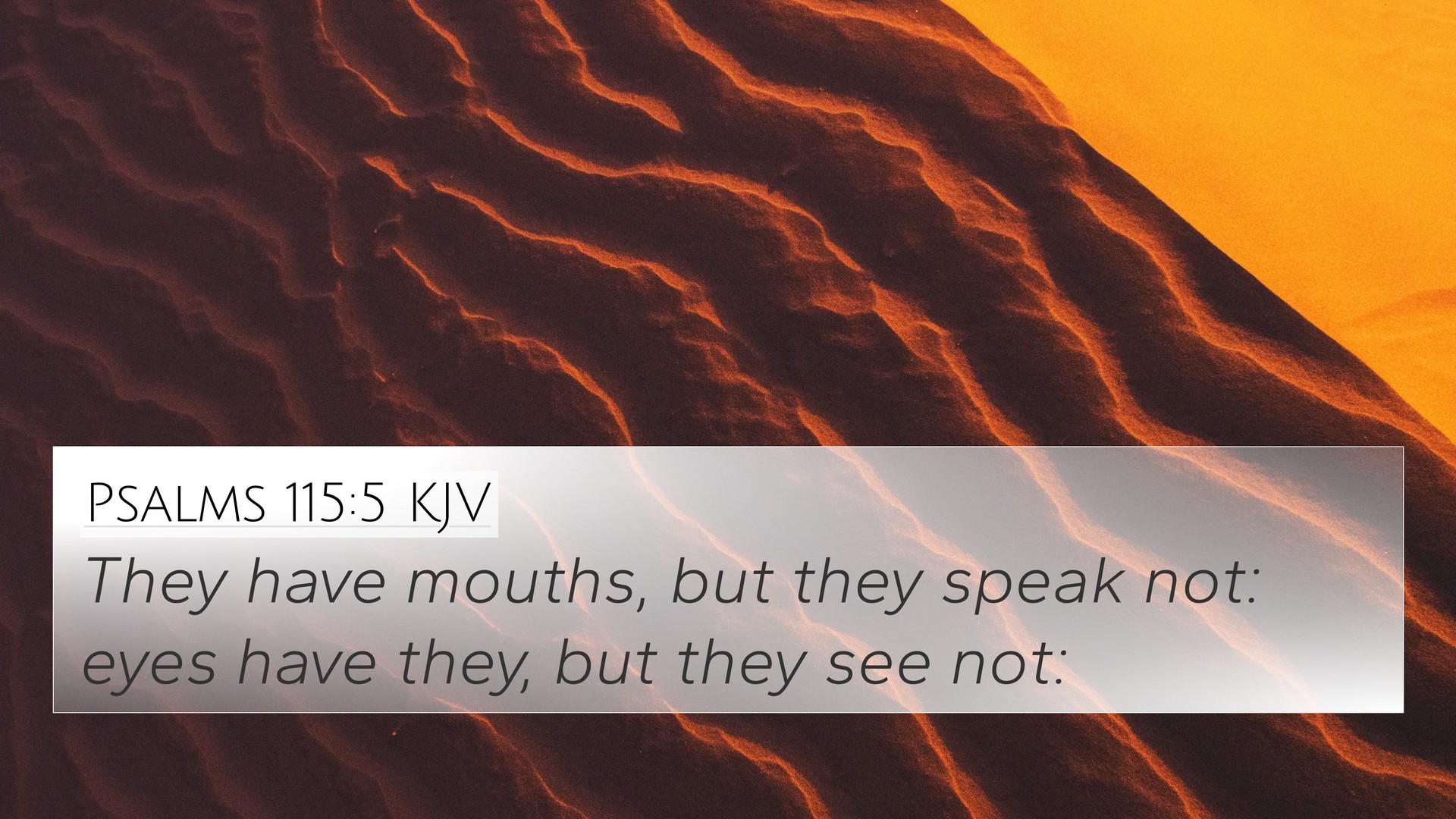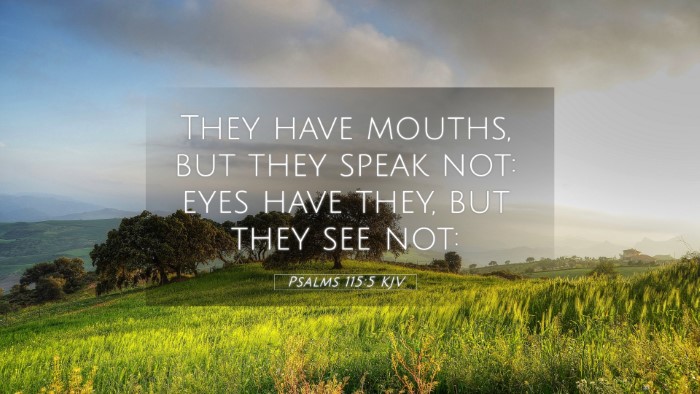Understanding Psalms 115:5
Psalms 115:5 states, "They have mouths, but they do not speak; eyes they have, but they do not see." This verse serves as a critique of idols and false gods, highlighting their utter inability to act or respond. Below, we will explore the meanings and interpretations offered by well-regarded public domain commentaries, integrating valuable insights about this verse.
Commentary Insights
Matthew Henry
Matthew Henry emphasizes that David contrasts the living God with the lifeless idols which the nations worship. He points out the absurdity of placing trust in objects made by human hands that lack the ability to engage or communicate. Henry notes that such idols embody a spiritual blindness and deafness from which their followers cannot escape.
Albert Barnes
Albert Barnes elaborates on the characteristic features of these idols. He explains that their inability to speak or see symbolizes their complete lack of divine attributes. Barnes suggests that the psalm serves as a reminder of the futility of trusting in created things instead of the Creator, reinforcing the theme of God's sovereignty over man-made images.
Adam Clarke
Adam Clarke draws attention to the symbolism of the physical attributes mentioned in this verse. He postulates that the psalmist is making a pointed theological argument—that those who create and serve these idols will become like them, lifeless and unresponsive. Clarke's commentary invites readers to reflect on the spiritual implications of idolatry in their own lives.
Thematic Connections and Cross-References
This verse is thematically connected to a variety of other scriptures. Here are 10 relevant Bible cross-references:
- Isaiah 44:9-20: This passage vividly describes the foolishness of idol makers and emphasizes the mockery of creating gods from earthly materials.
- Psalm 135:15-18: Similar themes are explored here, contrasting the living God with the lifeless idols that cannot respond to their worshipers.
- Jeremiah 10:5: This verse pictures idols as wooden objects that cannot move, further illustrating their powerlessness.
- 1 Corinthians 12:2: Paul reminds believers of their past; how they were once entangled in idol worship, affirming the relevance of spiritual awareness.
- Habakkuk 2:18-19: This passage discusses the embarrassment of relying on idols, reiterating their inability to speak or offer guidance.
- Acts 17:29-30: Paul argues against idolatry by declaring the true nature of God, distinguishing Him from made objects.
- Romans 1:21-23: This text elaborates on the foolishness of exchanging the truth of God for images, reflecting the spiritual downfall of nations.
- Psalm 96:5: This verse also addresses the worthlessness of gods made by human hands compared to the greatness of Yahweh.
- Isaiah 46:1-2: Here, the futility of idols is plainly stated; they cannot help those who carry them.
- Matthew 15:14: Jesus reflects on the fate of the blind leading the blind, which can be seen as a metaphor for idol worship.
Implications for Today's Believers
The significance of Psalms 115:5 extends beyond its historical context. In today's world, this verse challenges believers to examine what 'idols' might take precedence over their relationship with God. Idolatry can manifest in many forms—materialism, career pursuits, or even relationships—that may distract from spiritual truths.
Research and Cross-Referencing Tools
For those interested in further exploring the meanings and connections between Bible verses, various tools for Bible cross-referencing can enhance one’s study:
- Bible Concordance: An index of biblical words, allowing users to find where specific terms appear throughout the Bible.
- Bible Cross-Reference Guide: Compilations of verses that relate to each other based on themes or topics.
- Cross-Reference Bible Study: A method for examining how verses interact with and illuminate each other.
- How to Use Bible Cross-References: Guidelines and best practices for integrating cross-references into personal study.
- Bible Cross-Reference System: An organizational structure for categorizing related verses within the scriptures.
- Bible Reference Resources: Online tools and formats that facilitate in-depth scriptural analysis.
- Bible Chain References: A topic-focused framework for studying scripture that connects verses by related themes.
- Comprehensive Bible Cross-Reference Materials: In-depth literature or guides that systematically link related Bible passages.
Conclusion
Psalms 115:5 offers profound insights into the nature of God versus the futility of idolatrous worship. By cherishing these lessons and recognizing the implications of the psalm, contemporary readers can deepen their understanding and foster a more genuine relationship with God. The exploration of this verse, enriched by cross-references and structured commentary, showcases the interconnectedness of biblical truths and the importance of discerning the life-giving qualities of true worship.



